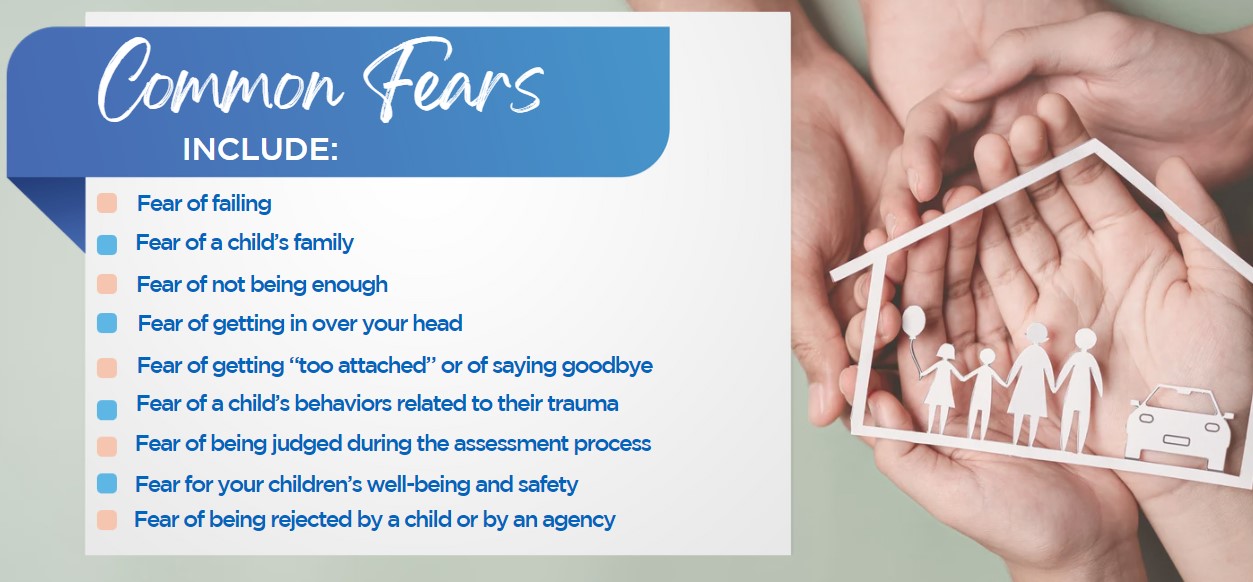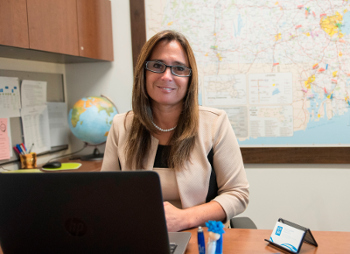Do you have a question about JRI services?

Foster care is a huge commitment.
The approval process alone can take half a year. It is the embodiment of the old adage “The journey of a thousand miles begins with a single step.”
Yet many people never take that first step. Wonderful, stable, emotionally healthy, kind, well-meaning, resilient people remain frozen in place- interested, but unable to bring themselves to hit send on the application. Other times, they send and when the Homefinder contacts them, they avoid answering the call. “Oh, um, you must have the wrong number,” I’ve heard from an embarrassed voice time after time.
I know it isn’t embarrassment. A huge piece of the avoidance (avoidance of completing the application or of responding) is fear.

Whew…That’s a lot of fear!
So is all hope lost if you have fears about fostering?
No! Fear is natural when making a big decision. Let’s look at some ways to work through the common foster fears.
Write It Out
Have you clicked on the application like dozens of times, but never filled out the form? Do you ignore calls from the agency after you’ve inquired? Don’t be embarrassed- this is common!
Sit down with your thoughts. What is holding you back? What feels scary or overwhelming?
Write it down. Write down every concern and question you have. Are there common themes? Does it relate to a failure or trauma you experienced? Does it relate to your support system? Is it more fear of being able to commit to the time involved in fostering?
Once you figure out why, you can start to consider solutions to those concerns or determine that it’s just not the time and put foster care away for a while.
Get Information
Check out our blogs, read articles, watch our “Foster Care Fast Facts” videos, and do some research. Information has the ability to put fears to rest or to help you see that those fears are valid and this isn’t the right step for you.
Talk with a Foster Parent
You know who knows the most about fostering? Foster parents!
Ask the agency you are speaking with (hopefully JRI!) if you can speak with a foster parent or two. We are always happy to put possible parents in touch with our families. We often try to find families with similar dynamics, so they can speak to your life and needs (single parents might be more supported by speaking with other single parents, first time parents with other first timers, folks with young kids speaking with other folks parenting young kids, etc).
Our parents will give you the good, the difficult, and the in between. Just like the Homefinding Team, they aren’t there to convince you to do something you’re not ready to do; they are there to give you information that is useful as you make up your mind.
Talk with a Homefinder
Homefinders are usually not foster parents, but they know how to help people figure out if fostering is a match. Homefinders do not want to mislead people into becoming foster parents. They want to help people who are ready to foster find the path forward. Homefinders speak with hundreds of people a year to help folks figure out if foster care fits and are very honest about the realities of fostering. They can help you process your fears and support you as you puzzle through the many aspects of foster care.
You can schedule a private consultation appointment with Homefinder Courtney or just call her.
Start Small- Respite Care!
Did you know that we have foster homes who are just available a weekend or two a month? These are respite parents. Respite parents allow long-term foster parents to take breaks, to attend to life events that are not child-friendly, and to recharge their batteries. Respite care can be a single night or even weeks at a time. Our respite parents set their schedules of availability and are able to form safe, positive relationships with kiddos in our program. Respite care is a great way to start out small with foster care, rather than diving right into a long-term placement.
Respite care allows foster parents to:
- Try out different demographics of children (age groups, developmental stages and needs, gender identities, and personalities) to see what fits best in their family and who they are able to most effectively serve
- Allow all family members to get used to the idea of fostering
- Take breaks and have time for reflection and processing between placements
- Not have to commit to the many meetings and appointments that long-term families must manage
It is normal to be afraid of change, to be anxious about trying something new, to be scared to add one more thing to your schedule. We would be worried if you had no trepidations; it would indicate that you aren’t aware of the significance of foster care. However, if you find yourself stuck in place and unable to make a decision about fostering, take action. Use the strategies about to help push through the fear and decide if fostering is the path for you.
To schedule an appointment with Courtney, please visit here and select an appointment.



